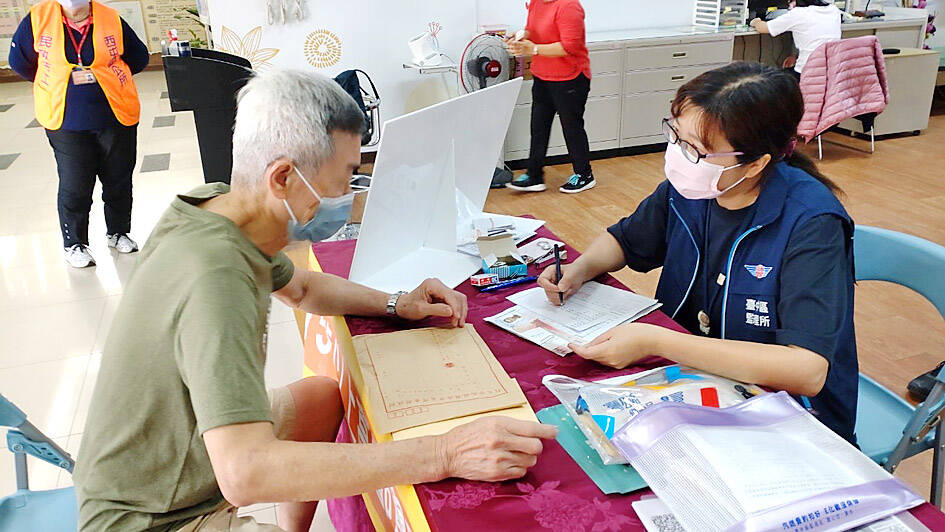People aged 70 or older who do not renew their driver’s license would be entitled to a monthly NT$1,500 public transportation and taxi subsidy as part of a program to improve traffic safety, the Ministry of Transportation and Communications said yesterday.
The ministry is to introduce 17 driving reforms next year, including removing true-or-false questions on the written exam for cars and scooters and lowering the age at which elderly people must renew their driver’s license to 70 from 75.
The Highway Bureau would offer preferential rates equivalent to the T-Pass program of 50 percent fares up to a maximum of NT$1,500 per month, the ministry said.

Photo: Huang Hsu-lei, Taipei Times
Services that the program covers includes city buses, intercity buses, Taiwan Railways and light rail trains, MRTs, public bikes, ferries and taxis, it said.
The subsidies are based on similar local government programs for elderly people, the bureau said, adding that they would only be applied if an elderly card is presented.
Eleven of Taiwan’s 22 administrative regions have elderly card systems for taxi fare payments, it said.
Elderly people who do not renew their driver’s license would be able to use the card to pay taxi fares, with the funds deducted from the e-wallet tied to the card, it said.
The subsidies would be available to anyone who registers once the program is launched next year and would be provided for two years, the ministry said.
The subsidies would be issued on top of other social welfare subsidies, Bureau Secretary-General Lin Yi-sheng (林義勝) said.
The bureau is mulling how to provide the new subsidies to residents of regions that do not have an elderly card system, Lin said.
Deputy Minister of Transportation and Communications Chen Yen-po (陳彥伯) said it is possible that the subsidies would be run entirely through the T-Pass program.

The manufacture of the remaining 28 M1A2T Abrams tanks Taiwan purchased from the US has recently been completed, and they are expected to be delivered within the next one to two months, a source said yesterday. The Ministry of National Defense is arranging cargo ships to transport the tanks to Taiwan as soon as possible, said the source, who is familiar with the matter. The estimated arrival time ranges from late this month to early next month, the source said. The 28 Abrams tanks make up the third and final batch of a total of 108 tanks, valued at about NT$40.5 billion

Two Taiwanese prosecutors were questioned by Chinese security personnel at their hotel during a trip to China’s Henan Province this month, the Mainland Affairs Council (MAC) said yesterday. The officers had personal information on the prosecutors, including “when they were assigned to their posts, their work locations and job titles,” MAC Deputy Minister and spokesman Liang Wen-chieh (梁文傑) said. On top of asking about their agencies and positions, the officers also questioned the prosecutors about the Cross-Strait Joint Crime-Fighting and Judicial Mutual Assistance Agreement, a pact that serves as the framework for Taiwan-China cooperation on combating crime and providing judicial assistance, Liang

A group from the Taiwanese Designers in Australia association yesterday represented Taiwan at the Midsumma Pride March in Melbourne. The march, held in the St. Kilda suburb, is the city’s largest LGBTQIA+ parade and the flagship event of the annual Midsumma Festival. It attracted more than 45,000 spectators who supported the 400 groups and 10,000 marchers that participated this year, the association said. Taiwanese Designers said they organized a team to march for Taiwan this year, joining politicians, government agencies, professionals and community organizations in showing support for LGBTQIA+ people and diverse communities. As the first country in Asia to legalize same-sex

MOTIVES QUESTIONED The PLA considers Xi’s policies toward Taiwan to be driven by personal considerations rather than military assessment, the Epoch Times reports Chinese President Xi Jinping’s (習近平) latest purge of the Chinese People’s Liberation Army (PLA) leadership might have been prompted by the military’s opposition to plans of invading Taiwan, the Epoch Times said. The Chinese military opposes waging war against Taiwan by a large consensus, putting it at odds with Xi’s vision, the Falun Gong-affiliated daily said in a report on Thursday, citing anonymous sources with insight into the PLA’s inner workings. The opposition is not the opinion of a few generals, but a widely shared view among the PLA cadre, the Epoch Times cited them as saying. “Chinese forces know full well that